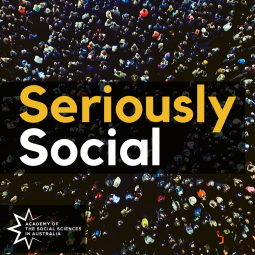Will there be a Generation COVID? According to Dan Woodman, Associate Professor of Sociology at the University of Melbourne and President of both the Australian Sociological Association and the Council of Humanities Arts and Social Sciences, it’s not that simple. Dan’s expertise is in generational issues and in the wake of pandemic lockdowns, he looks at how COVID-19 is impacting people in multi-generational homes, and more importantly, their relationships.
Dan is also behind a project at the University of Melbourne called Life Patterns, which has tracked two cohorts of young Australians through their 20s as they make the transition to adulthood to look at how that transition has changed. Those two groups are Gen-X and Gen-Y or the Millennials, and Dan says we may see an emergence of a new social group, Generation COVID, whose lives are forever changed following the global Coronavirus pandemic.
 If you’re short on time you’ll enjoy this ‘Too Long Didn’t Read’ cheat sheet (TLDR) from Dan’s fascinating conversation with podcast host Ginger Gorman. Listen to the full episode at seriouslysocialpodcast.org.au or on your favourite podcast platform.
If you’re short on time you’ll enjoy this ‘Too Long Didn’t Read’ cheat sheet (TLDR) from Dan’s fascinating conversation with podcast host Ginger Gorman. Listen to the full episode at seriouslysocialpodcast.org.au or on your favourite podcast platform.
1. COVID has highlighted an intergenerational solidarity among multiple generations living under one roof.
Despite perceived tensions between Boomers and Millennials, one of the things that has changed and allowed intergenerational households to develop and to function, (sometimes even thrive) the fact that culturally, young adults living at home now get treated as adults.
“It has made certain kinds of intergenerational solidarity, particularly in family groups jammed together during isolation, even more important than it used to be.”
2. Job security has been a key issue during the pandemic, however generational groups are tackling this shared concern differently.
“I have a recent journal article that looked at attitudes towards job security in the two cohorts in my study – the group that finished school in the early-1990s and the group that finished high school in the mid-2000s. It was very funny and somewhat against the generational stereotypes of both of the cohorts that they put job security and a job that gave security as the most important thing.
So, that hasn’t changed, but what really changed was how the two cohorts, when they were young and even when they got to 30, thought about job security in a very different way. It was about a set of skills that their work might give them that gave them security to find other jobs and opportunities for the cohort who finished in 2006, which was quite different to the group who finished in the early-1990s.
So, sometimes, what these generations are about is not a radically opposite view on what life should be like, but a different understanding based on the structures they face about how you go about doing that.”

3. The pandemic will change young people in the years ahead, but it’s not as simple as ‘Generation COVID’.
“I’ve seen a lot of articles and some more academic writing start to come out about how things are going to be totally different after this. And I’m a little bit sceptical of that because I think we’ve seen the capacity for us to return to our footie games and shaking hands and going to the movies after previous pandemics.
And economically, what people tend to mean when they say, “This is such a big event. We can’t go back,” is that we shouldn’t go back because I think what we had before this wasn’t working very well for everyone. So, as much as anything, it’s almost like a political statement. And what these events can do is kind of reset the stakes of politics. So, sometimes, you see takes on generations where they treat a new cohort like they’re all of one with all one value set.”
4. Coronavirus will change the life course for multiple generations, not just Generation COVID.
“Like the Great Depression, there are some ways that the experience of Coronavirus will be a chance for people to build attitudes and mindsets and ways of thinking about the world that might give some individual resilience. But, maybe more importantly, [it will] allow us to have a new kind of social resilience…that’s a new opportunity to connect across some of these generational differences. It’s not about obscuring them at all, but taking them seriously and asking, “How do we build societies that are going to work for all of us in these conditions that we’re going to face?”